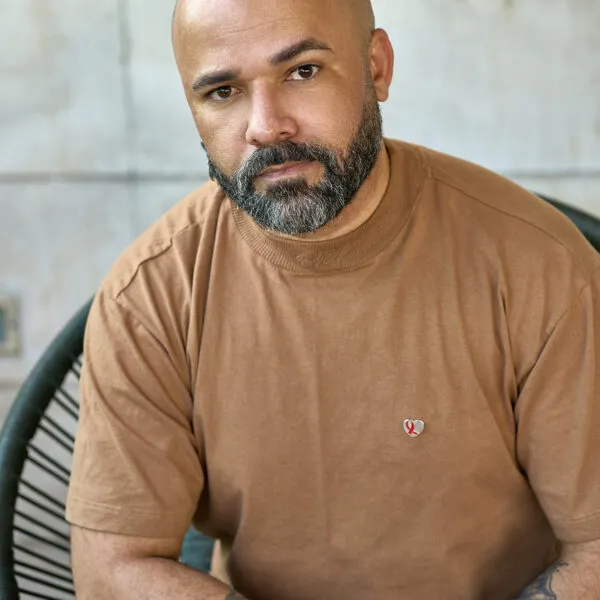
Rodrigo
To Exist Is to Resist My name is Rodrigo Silveira.…
My name is George Grimes.
It was 2005, and my life was one of constant movement. I worked in aviation security, travelling the world—Barcelona, Athens, Paris—it all sounds so glamorous, doesn’t it? But that year, everything came to a halt.
I was living in Barcelona when it started. One night, I woke up drenched, my body trembling, my insides in turmoil. It wasn’t just the sweat or nausea—it was like something deep inside me was unravelling. I remember sitting on the edge of the bed, shaking, trying to convince myself it was just a bad bug. But the truth? I could feel it in my bones. Something was seriously wrong.
I forced myself to carry on. As planned, I flew back to the UK, hoping the sickness would magically disappear. It didn’t, but I was stubborn, too busy, too proud, and ignored it. Shortly after, I flew to Athens for work.
That’s when it hit me like a freight train. The sickness took over, relentless, grinding me down day by day. I was losing control of my own body, so I called in a doctor. He examined me, poked and prodded, and ran through a laundry list of possibilities. Then he said the words that turned my world upside down:
“George, it might be HIV.”
I’ll never forget that moment. My heart stopped. HIV? Me? I couldn’t even begin to process it. I brushed him off and told myself he was wrong, that it was something else. But deep down, the seed of fear had already been planted.
You know what makes me angriest? I did know about HIV. I knew people living with it. But I didn’t know enough. And no one in my circle—my friends, my community—ever talked about what to do if something went wrong. Months earlier, in Spain, a condom had broken. At the time, I didn’t think much of it. No one had told me about PEP—post-exposure prophylaxis. No one said, “George, if this happens, you will have a short time to act.” I could’ve gone to a hospital, gotten the treatment, and stopped the virus in its tracks.
But I didn’t know. And that ignorance? It cost me.
After Athens, I ended up in Paris for work. By then, I was a wreck. I walked into a private hospital because I had work insurance, desperate for answers. They thought it was food poisoning. They hooked me up to IV drips, took blood constantly, and kept me there for days. My white blood cell count was dangerously low. They didn’t know what was wrong, but they knew I was sick—sick.
When they discharged me, I was still no better. I was scared, exhausted, and completely lost. It wasn’t until I got back to London, to St. Mary’s Hospital, that I finally got tested. And there it was: HIV positive.
I sat there, staring at the results, and suddenly, everything clicked. The sickness, the chaos in my body—it all made sense. But you know what? I didn’t cry. Not once. I made a decision right then and there: this virus would not break me.
I wasn’t put on medication straight away because my CD4 count was just above 200. But soon after, I joined a clinical trial for Kaletra. Oh, God, Kaletra. That drug was pure hell. Hallucinations. Nausea. I felt like my body was being ripped apart all over again.
There’s one memory that still haunts me. I was flying to Bangkok, and I needed to keep the medication cold. I asked a flight attendant if she could store it in the coldest part of the cabin. She stared at me with suspicion, loud enough for everyone to hear, and asked, “What’s this for?”
People turned to look. My stomach sank. I panicked and said the only thing I could think of: “Cancer.”
The shame of that moment—it’s hard to put into words. I wasn’t ashamed of having HIV, but the stigma crushed me. Usually, I would’ve stood up for myself, but I was too sick, too tired. I just wanted to get through that flight without another fight.
That year on Kaletra was a nightmare, but I survived. And when I came out the other side, I decided survival wasn’t enough. I needed to rebuild.
HIV didn’t destroy me—it transformed me. I found strength in places I never expected, like the mountains. In 2022, I became the first mountaineer living with HIV to summit Mount Denali in Alaska. The year before, I summited Mont Blanc. On those peaks, I feel free. Up there, I’m not George with HIV—I’m just George, climbing against the odds.
For years, I kept my status hidden. I was terrified of what people would think, of being treated differently. But eventually, I realized the secrecy was suffocating me. I decided to own my story. Most people have been supportive, but ignorance is still everywhere. Even in the gay community, people don’t understand U=U—undetectable equals untransmittable. The misinformation is heartbreaking.
If I could tell someone newly diagnosed anything, it’s this: Don’t panic. Don’t let fear consume you. HIV is not the end—it’s just a chapter. Look at me: I’m climbing mountains, living my dreams. Life doesn’t stop. It evolves.
Here’s the incredible truth: People living with HIV today often have a longer life expectancy than those without it. The care we receive is so advanced that it catches everything early. Bone density, cholesterol, blood—everything is monitored.
The irony? The virus that once terrified the world is why I’m healthier than ever.
This is my story. It’s messy and painful, but it’s also a story of resilience. It reminds us that we are stronger than we think, and no matter what life throws at us, we can overcome it.
Share this story on: